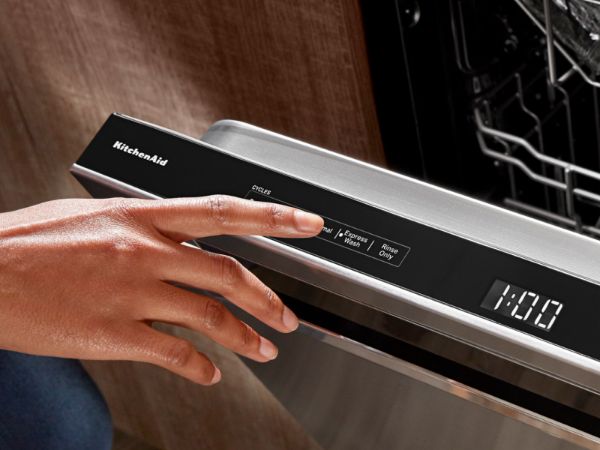When it comes to dishwashing cycles, dishwasher owners often face the choice between a quick wash and a normal wash. These options offer different advantages and cater to varying needs.
In this article, we will delve into the dishwasher quick wash vs. normal wash debate, exploring the features, cleaning efficiency, and factors to consider when selecting the ideal cycle for your dishwashing needs.
Table of Contents
Quick Wash: Time-Saving Convenience
The quick wash cycle is designed for those times when you need clean dishes in a hurry. Here’s what you need to know:
- Duration: Quick wash cycles are typically shorter than normal wash cycles, ranging from 15 to 30 minutes. This makes them ideal for situations where you have a smaller load or when you need dishes cleaned quickly for immediate use.
- Cleaning Performance: Quick wash cycles focus on removing light food debris and stains from dishes. While they may not be as thorough as longer cycles, they still offer satisfactory cleaning results for dishes with minimal residue.
- Energy and Water Efficiency: Due to their shorter duration, quick wash cycles consume less energy and water compared to normal wash cycles. This makes them an environmentally friendly option and can help reduce utility costs.
- Suitable Load: Quick wash cycles work best for lightly soiled dishes that don’t require intense cleaning. They are suitable for everyday use or when you’re in a time crunch and need a quick turnaround.
Normal Wash: Comprehensive Cleaning and Versatility
The normal wash cycle is the standard setting for most dishwashers. Here’s what you should know about it:
- Duration: Normal wash cycles typically range from 1 to 3 hours, depending on the dishwasher model and selected options. They provide more time for thorough cleaning and removal of tough stains, dried-on food, and greasy residues.
- Cleaning Performance: Normal wash cycles offer comprehensive cleaning capabilities. They employ higher water temperatures, extended wash times, and multiple cycles (prewash, wash, rinse, and dry) to ensure thorough removal of food particles and stains from dishes, utensils, and cookware.
- Versatility: Normal wash cycles are suitable for a wide range of dishwashing needs. They can handle heavily soiled items, pots, pans, and dishes with baked-on food residue. If you frequently deal with heavily soiled loads, normal wash cycles provide the best cleaning results.
- Intensive Options: Many dishwashers offer additional options to enhance the normal wash cycle. These may include options for heavy-duty cleaning, sanitizing, or eco-friendly settings. These features allow customization based on your specific requirements.
Factors to Consider
- Time Constraints: Evaluate how quickly you need your dishes cleaned. If you have limited time or need immediate access to clean dishes, the quick wash cycle is a convenient option. However, if time is not a concern and you prioritize thorough cleaning, the normal wash cycle is the better choice.
- Soil Level: Consider the level of food residue and stains on your dishes. If they are lightly soiled and require a quick refresh, the quick wash cycle will suffice. For heavily soiled items or tough-to-clean stains, the normal wash cycle’s extended duration and intensive cleaning options will deliver superior results.
- Energy and Water Usage: Take into account your energy and water conservation goals. Quick wash cycles consume less energy and water, making them a more efficient choice. However, keep in mind that normal wash cycles offer a deeper clean but require more resources.
Conclusion
The dishwasher quick wash vs. normal wash dilemma ultimately depends on your specific needs and circumstances. The quick wash cycle offers time-saving convenience, energy efficiency, and satisfactory cleaning performance for lightly soiled dishes. On the other hand, the normal
wash cycle provides comprehensive cleaning, versatility, and superior results for heavily soiled loads and tough stains.
Consider your time constraints, the level of soil on your dishes, and your energy conservation goals when making your selection. If you need dishes cleaned quickly or have lightly soiled items, the quick wash cycle is a practical choice. It saves time, conserves energy and water, and delivers satisfactory cleaning results.
However, if you prioritize thorough cleaning and have heavily soiled dishes or stubborn stains, the normal wash cycle is the optimal option. It offers extended wash times, higher water temperatures, and multiple cleaning cycles to ensure a deep clean and effective removal of food residues.
Remember to utilize any additional options or settings available with the normal wash cycle, such as heavy-duty cleaning or sanitizing, to further enhance the cleaning performance based on your specific needs.
It’s worth noting that some dishwashers offer a “smart” or “sensor” feature that automatically adjusts the cycle duration and intensity based on the load and soil level. This feature can be beneficial for maximizing efficiency and cleaning effectiveness while reducing the need for manual cycle selection.
In conclusion, the choice between dishwasher quick wash and normal wash depends on the level of soil, time constraints, and desired cleaning results. By understanding the features and benefits of each cycle, you can make an informed decision and ensure that your dishes receive the optimal cleaning they deserve. Whether you prioritize speed or comprehensive cleaning, both options offer convenience and efficiency to simplify your dishwashing routine.

